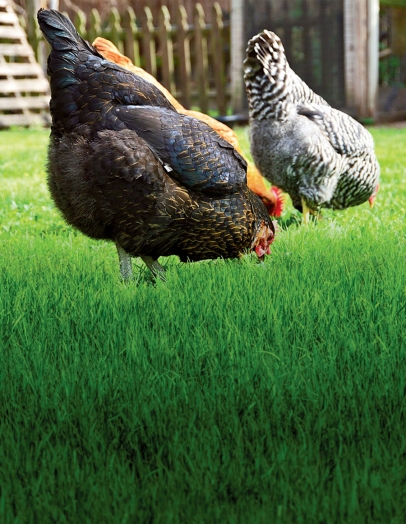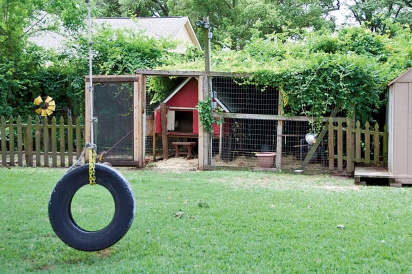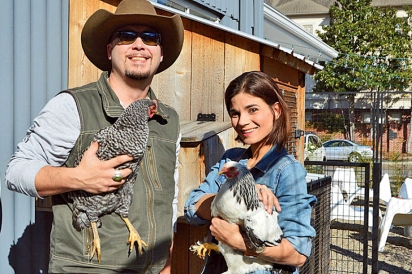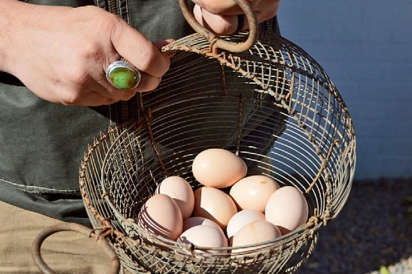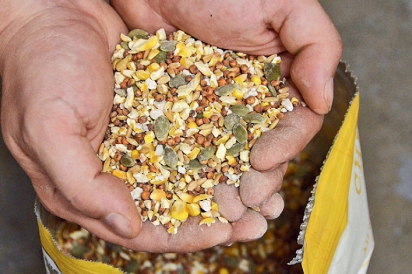How to Keep Backyard Chickens in Houston
I cannot lie: I like fluffy butts. Such is the oft-spoken truth of the urban chicken keeper. We are a growing flock of folks who bring the term “local food” to a very literal level: We raise chickens in our own urban backyards.
“You have chickens?!” is the common refrain from those who meet one of us, followed closely by “Do you get eggs? I bet they taste delicious, don’t they?” Yes and yes comes the reply, often with a laugh. Mention of keeping chickens makes for a great conversation starter.
Surprised reactions are likely to dwindle, however, as legislation concerning city hens continues to loosen across the country and more communities recognize the value of keeping chickens as a local food source and natural pest control as well as emotional entertainment.
Houston is behind the curve so far with a Code of Ordinance that restricts keeping poultry, including chickens, turkeys, geese and ducks unless they are kept “at least 100 feet from any habitation of human beings, church, school or hospital.”
The wording is also a little vague, with one section saying no more than 30 fowl are permitted while another section says a permit may be obtained for up to seven hens. With homes and yards in such close proximity, the options of keeping chickens “legally” are slim. Sanitation is an oft-used excuse for prohibiting poultry, but even as a serious dog lover I see (and hear) how chickens are generally less intrusive than the average canine. Kept within healthy limits, chickens are clean and discreet. Plus, instead of big piles of dog poop they provide an all-inone self-propelling lawn fertilizer gently scattering their gifts throughout the yard.
In the meantime, preliminary talks to broaden Houston’s urban chicken ordinance are underway between Mayor Sylvester Turner and Mike and Nicole Graham of The Garden Hen and My Urban Coop, who are revolutionizing what it means to care for chickens in the nation’s fourth-largest city.
“With such a large food desert population [in Houston] and dated chicken laws, it would only be natural to revisit our chicken regulations to simply look for the option of fresh eggs daily in our own backyards and to be more connected to our food,” say the Grahams. “Why not [have] a garden in the front yard and hens in the backyard? If you have a fenced-in backyard, you should not be forbidden to raise a few hens. We do not want chickens roaming all over, but a controlled, regulated number for each home that wants them. Overall, education on the subject of chickens is probably needed across the board from our city officials all the way down to the students we teach our life cycle program to [because] chickens have many misconceptions. Our mission is to educate everyone so the ‘Chicken Madness’ can stop.”
Although I spent my formative years roaming rural pastures with friends in the North Carolina countryside, my family never owned livestock and my exposure to farm animals was limited to friends’ farms or wandering the barns every year at the North Carolina State Fair. When my husband and I bought a home in the Houston neighborhood of Oak Forest that literally came with four chickens and a chicken coop, I was smitten and “the girls” remain my favorite part about that purchase nearly four years later. In terms of legality, we haven’t formally measured the distance from the coop to our neighbors’ homes but estimate we’re just shy of the technical minimum. Those who know we have chickens don’t care (our backyard neighbors have a large pig so it’s all relative) and without complaints we see no reason to advertise them.
Owning chickens delivers more than incredibly tasty eggs. I’ve adopted a phrase my mom likes to say: “Livestock makes a landscape more beautiful to look at,” and it’s true. Our yard is pretty as-is with gardens and trees, but the hens are the lagniappe of our lawn. Sitting on the back stoop on a warm evening and watching the girls wander about is meditative. Their calmness calms me and I find joy in our daily greetings, feeding them treats of chilled melon on a hot day, praising their keen hunter skills and gathering eggs which, to me, are merely a bonus. Oh, and did I mention you get to name them? Waffles, Thelma & Louise, and Choke are a few of ours.
Everyone wants to know if I have a rooster, or roo, and then inevitably asks if I get eggs without a rooster. Roosters aren’t necessary unless you want chicks or need flock protection from predators. Hens, on the other hand, are generally very docile and quiet unless frightened, preferring to communicate via gentle clucks and chortles as they go about their business of laying eggs, chasing down pests, and scratching for snacks in the grass. Proper hygiene and coop maintenance prevent unpleasant smells and in turn significantly mitigate risk of disease.
Chicken keeping can morph from passionate hobby to full-time business, as was the story for Mike and Nicole Graham, who have led Houston’s dream team for urban chicken advocacy, education, custom coops, chicken food and endless resources since 2012 through their two businesses The Garden Hen and My Urban Coop. The Garden Hen focuses on education in schools and businesses along with building custom chicken coops.
My Urban Coop, which was founded with Seth Bruce and Matthew Weinstein, features “chicken chew,” a specialized all-inclusive high-protein chicken food that includes beneficial ingredients like organic kelp to aid with digestion and oyster shell, which is typically sold separately.
The ambitious couple is currently building their 93rd custom coop and have reached more than 10,000 students in the past three years. Their program Project Life Cycle: The Chicken provides resources for children to observe the incubation and hatching process directly from the classroom. While they eagerly collaborate with any interested school, they ardently support schools in food deserts to help children improve their food supply through exposure and education of healthy food and empowering them to take an active role in their communities.
The Grahams have a tub full of letters and thank you notes from kids saying they want to be farmers. It’s the “best feeling ever,” says Nicole, beaming.
Developments are also taking notice, they say, with their largest project to date built for Harvest Green, the sustainable planned community from Johnson Corporation that replaces the traditional town square with a large farm accessible to all residents. “You’re having developments now understand that people want this—their HOA dues go towards this—and they can feel part of the farm,” says Mike. “Whereas cities may have reservations about letting people do it on their own, we’re having developers come in and base developments on farms and healthy living.”
Life in the city may never look the same again, which is eggcellent news worth celebrating. In the words of Mike and Nicole Graham, “Cheers to city chickens!”
Between writing this story and going to press, Ellie Sharp and her husband flew the coop & relocated to South Carolina. Her feathered girls found a home at Blue Heron Farm and she looks forward to raising a new flock soon.
About Chickens and Diseases
The question of disease transfer between humans and birds is a common concern. The scientific term is zoonosis, which refers to diseases that normally exist in animals but that can infect humans.
“There are several zoonotic species that exist between birds and humans,” says Dr. Sara Kaplan-Stein, DVM, MPH, associate veterinarian at Animal Medical Center of the Village near Rice Village, though she says the bigger danger in her mind is disease transmission between captive owned birds and wild birds. She points to thorough hand-washing after handling birds as an important step in limiting exposure to disease and to follow-up with a physician should a person feel ill.
“Maintaining good husbandry, quarantining new birds, separating ill birds and testing for illness as indicated ensures that, for the most part, backyard chicken ownership is a safe and enjoyable hobby for people all over the world,” she says.
In terms of disease transmission, interaction between common household pets and backyard flocks poses very little risk, if any, but she cautions against comingling. “If the animals are supervised then it may be OK,” she says. “But keep in mind [that] dogs and cats are predators and chickens are prey. Even though these animals are technically domesticated you cannot completely eliminate hundreds of years of basic instinct.” She says predatory attacks are a common reason she sees sick or injured chickens.
To maintain biosecurity, wash hands and sanitize anything that came in contact with other birds or enclosures before reentering your own territory to limit potential disease transfer. When bringing new birds into an existing flock, consider quarantining the new bird for one month to observe for illness before introducing to the rest of the group.


